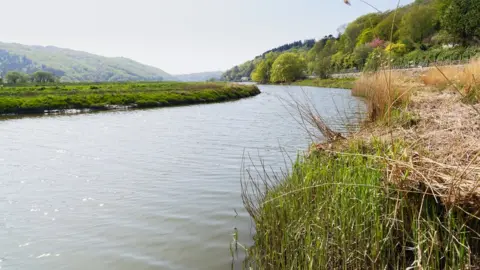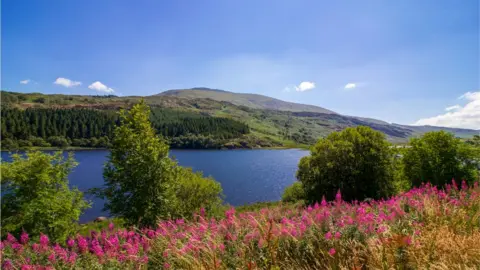Farm subsidies: Basic payment scheme to end in 2021
 Getty Images
Getty ImagesThe current subsidy given to Welsh farmers will be scrapped after 2021, it has been confirmed.
The Basic Payment Scheme gives farmers money based on how much land they use.
The Welsh Government plans to replace the scheme and will consult on a new proposal for an annual payment based on work done to improve the environment.
The NFU Cymru union said any new scheme following Brexit must offer equal benefits to protect farmers from price volatility and safeguard food security.
Opposition parties said the change would remove a "safety net" for Welsh farmers, but Wildlife Trusts Wales welcomed the announcement.
European Union subsidies - amounting to around £350m a year - make up more than 80% of farm incomes in Wales on average.
The vast majority of cash is currently given to farmers as so-called "direct payments", under the Basic Payment Scheme.
The vote to leave the EU prompted a review of the subsidy, which Rural Affairs Secretary Lesley Griffiths has said made Welsh farms uncompetitive.
Initially, the Welsh Government had suggested two new grant schemes would come in its place after the UK leaves the EU.
One would offer business grants, while another would reward farmers for delivering public goods such as protecting wildlife habitats and tackling climate change through restoring peat bogs and planting new woodlands.
Following a consultation, Ms Griffiths said she had decided to roll both schemes into one.
"I am proposing a new single sustainable farming scheme, allowing us to explore economic, environmental and social opportunities at the same time," she said.
 Getty Images
Getty ImagesThe minister said the proposals would help secure a "prosperous, resilient agricultural sector in Wales".
"We will propose an annual payment to farmers in return for the environmental outcomes delivered on their farm - targeted at reversing biodiversity decline, meeting our carbon budgets and hitting our clean air targets," she said.
A further consultation on the plans will be launched ahead of the Royal Welsh agricultural show in July.
The payments in their current form are set to continue until 2021, after farming leaders warned the changes were being brought in too quickly and could decimate the industry.
According to the Farm Business Survey, in 2017/2018, the average income from the basic payment scheme in Wales was £16,651 for dairy farms, £14,229 for cattle and sheep farms in lowland areas and £22,705 for cattle and sheep farms in "lesser favoured areas", typically upland farms.

NFU Cymru
President John Davies claimed "the devil will be in the detail".
He said: "Any new scheme must offer equal, if not superior, benefits [to the Basic Payment Scheme], which is why NFU Cymru has always advocated the inclusion of a stability payment to help protect farmers from volatility, safeguard food security and facilitate the delivery of outcomes that benefit the whole of society."
The Farmers' Union of Wales
The union gave a "cautious welcome" to the announcement "as a step towards recognising the threats and opportunities both Brexit and changes to rural support could bring".
President Glyn Roberts said: "We now hope that the next consultation... will mark a further move towards recognising the dangers to our communities and economy of moving rapidly towards untried and untested approaches that could be the most radical to be introduced since the Second World War."
Wildlife Trusts Wales
Chief executive Rachel Sharp welcomed the announcement.
"Post-Brexit, Wales will need a new payment scheme to replace the Common Agricultural Policy. This gives us an unprecedented opportunity to revitalise our countryside in a way that meets the needs of people and the environment, for generations to come. Improving the environment and providing public goods provides the strongest rationale for public investment in land management," she said.
However, they said they were concerned political pressure will mean future funding may become diluted through competing demands.
CLA Cymru
Rebecca Williams, director of CLA Cymru, whose members are farmers, landowners and rural businesses said the announcement was significant but there was more work to do.
"To secure the future of [the rural economy], it is important that the support-mechanism recognises and actively encourages Welsh farmers' entrepreneurship and ingenuity."
The Conservative Party
Rural affairs spokesman Andrew RT Davies AM said there was "real concern" among the farming community and it was vital to see the finer detail of how a new scheme would work.
"Farming plays a hugely important role in the Welsh economy, particularly in our rural communities, and any new scheme must ensure this continues," he said
Plaid Cymru
Rural affairs spokesman Llyr Gruffydd said the change could have "devastating consequences".
"The Welsh Government has no idea what our trading relationship will be with the EU in a matter of months and neither do they know what level of funding they will receive from Westminster to replace CAP farm support.
"Without the safety net of some form of direct payment the Welsh Government is pushing Welsh farming blindfolded off a cliff."
Brexit Party
The Brexit Party's Mandy Jones AM said the Welsh Government would not know what the impact of the change would be.
"Taking away basic payments, the Welsh Government will take away the safety nets of farmers," she said.
